Creative Writing University
Intro
Experiment with a range of styles and forms, developing an understanding of the art and craft of writing and exploring its purpose in the world. The degree draws on the diverse city of Brighton & Hove as a source of inspiration that will develop your passion for writing.
The course is for students keen to apply critical reading and creative skills to innovative writing practices. Covering a wide range of genres, cultures and identities, you will study techniques and develop expertise in writing that you will apply to work-based scenarios including publishing.
Guided by your tutors, you will consider a variety of key texts and be asked to connect your own work in relation to political, social and cultural theories. Innovative teaching will underpin your studies, taking you into creative spaces such as museums, galleries, theatres, archives, the South Downs National Park and Brighton itself.
There will be frequent opportunities to meet and work with publishers and inspirational writers to further develop your love and understanding of your craft. This is further enhanced by events such as the Scrivener Series of visiting writer workshops, spoken word events and an annual masterclass with a nominee for the Man Booker prize.
Key facts
Location Brighton: Falmer
UCAS code W800
Full-time 3 years
With year abroad 4 years
Course content
Course structure
Full-time students will have a minimum of nine hours' contact time a week in a range of lectures, seminars and workshops but they will be expected to carry out independent study for the rest of their time. Part-time study is possible and this can be tailored to suit individual needs.
There are placement opportunities available in the second year as well as field trips to theatres, museums, schools, retirement villages and other community organisations. You are also welcome to study abroad after your second year.
Research informs all our teaching and you will benefit from the insight generated by our staff during their research. You will learn through lectures, seminars and workshops as well as small group and individual tutorials.
Our courses are reviewed and enhanced on an ongoing basis in order to make sure that what you learn with us is relevant and that your course enables you to develop appropriate skills. When you apply to study with us, we will inform you of any new developments in your chosen programme through Student View.
Year 1
In your first year you will develop your awareness of writing genres and work with local writers.
Modules
- Stories and Storytelling
How do stories create and communicate experiences, identities and cultural meaning? How do they work to perpetuate and challenge social structures? On this module you'll study fairy tales, myth, novels, short stories and visual narratives (for example, film, comics and graphic novels, gaming) to discuss these questions. Through reading and guided research you'll identify and pursue your own interests in critical, creative and reflective ways and produce a reading and research journal.
- Literature and Theory
This module will introduce you to the key philosophical and theoretical approaches to the reading of literary texts, and situates that knowledge within a historical overview of literary criticism. By the end of the module you will be able to apply theoretical vocabulary and knowledge of critical concepts in the interpretation of literary works.
- Textual Encounters: Reading, Writing, Thinking
How do texts make meaning? How can we understand the relationships between readers, writers, and texts? This module introduces questions crucial to the study of literature and culture through examining reading, writing and thinking as dynamic and dialogic cultural practices. You'll develop the skills necessary to become an effective writer, thinker and critic, enabling you to develop informed responses to texts and ideas in dialogue with others as members of a collaborative intellectual community.
- Storying The Self
This module will introduce you to practices of storying the self in writing and digital media. Through creating a first person story combining audio script, music and still image, you will engage with the expressive complexities of autobiographical representation. The module will also give you the creative writing tools to experiment with storying the self in a variety of written genre.
- Drama in Society
This module will introduce you to drama as both performative and literary texts. The module approaches drama through practical, textual and theoretical readings, as well as through placing drama in its social and political contexts. How do plays engage with the world we live in today? The module focuses on twentieth century dramatic texts in order to explore the role and function of drama in society. You will look at, for example, naturalist drama, Brechtian drama, theatre of the absurd, feminist theatre, postcolonial theatre, and in-yer-face theatre.
- Brighton Writes
Brighton is a vibrant and unique place that has impacted on British and European culture, as well being at the forefront of social changes since the eighteenth-century. This module is a literary and cultural exploration of Brighton as a place. You will engage and connect with Brighton's history, literary culture and your own creative writing practice. The module benefits from several city trips, which will bring learning materials to life.
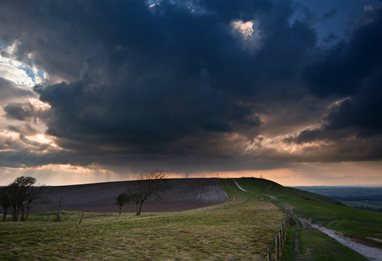
Year 2
Modules
- The Art of Publishing
- Literature in Practice
- Research and Practice
- Creative Writing: Process and Craft
Options*
- Writing for Stage, Radio and Screen
- Early Modern Literature
- Twentieth-Century Literary Experiments
- Literature and Art History
- Poetry and Process
- Introduction to Journalism
- Cinema and Society
- Photography
- Life Online: Digital Media and Culture
- Studying Travel Writing
- Queer Writing
- Video Documentary Project
- Power and Persuasion
- Reading the Graphic Novel
You can also choose option modules from across our humanities and arts subjects.
*Option modules are indicative and may change, depending on timetabling and staff availability.
/Arts_Humanities_Dec2014_AW_085-Cropped-382x261.jpg)
Final year
Modules
- Dissertation
- Final Year Conference
Options*
- Autoethnography
- Reading and Writing Landscape
- Creative Writing Project
- Images of War
- From Script to Screen
- Community Placement: Theory in Practice
- Russian Literature
- Women's Writing and Feminist Theory
- Restoration Drama
- Gothic: Texts and Contexts
- Victorian Sexualities
- Brighton Rocks
- Writing the Contemporary
- Post-colonial Literatures
- Post-war American Literature
- European Literatures and Film
- Adaptations
- (Re)Viewing Shakespeare
- Literature and Philosophy
- Apocalypse, Utopia and Dystopia
- Popular Culture: Europe and Beyond
- Conflict, Migration, Borders
- Culture Wars: Class, Race, Gender and the Politics of Taste
- Literature and the World Wars
- Analysing Big Data: Quantitative Methods in Language Research
- Public Journalism
- Autobiography and the Screen
*Option modules are indicative and may change, depending on timetabling and staff availability.
Watch students talking about their experiences of the Community Placement module.
Meet the team
Craig Jordan-Baker, Senior Lecturer in Creative Writing. Winner of the 2018 Excellence in Facilitating and Empowering Learning Award. Craig's drama has been widely performed, and his writing widely published. Craig's first novel The Nacullians will be published in 2020. You can read more about Craig on his staff profile.
Dr Jess Moriarty researches in the field of teaching writing practice, especially in auto-ethnographical academic writing and in creative writing with undergraduates. Another winner of the Teaching Excellence award, she is also co-founder of Work Write Live, which provides a range of writing short courses and volunteering opportunities for students to develop vocational and academic skills. You can read more about Jess on her staff profile.
Ross Adamson, Senior Lecturer in Media and Digital Storytelling. His research interests are in narrative inquiry, documentary filmmaking and auto/biographical pedagogies. You can read more about Ross on his staff profile.
Julie Everton, Senior Lecturer, playwright and script editor. She teaches drama, script writing, and screenwriting. Her research includes writing about real events/people, models of script development and autoethnography. You can read more about Julie on her staff profile.
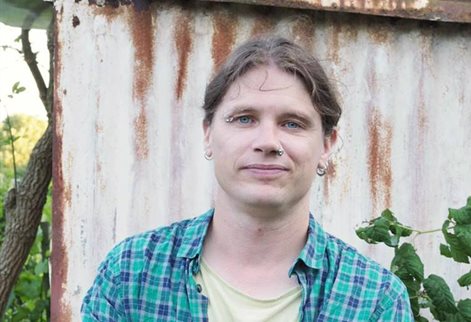
Craig Jordan-Baker
How this course is delivered
Our approach
We want you to spend as much time on campus as possible. From semester 1 of the academic year which starts in September, every student will have some face-to-face, on-campus learning in their timetable. Your timetable is being designed to make sure that you can make the most out of your time on campus, and all of the usual campus facilities – libraries, learning spaces, restaurants, gyms and more – will be open. Your timetable will be available in My Studies from late September.
Teaching on your course
In semester 1 you'll be on campus regularly for seminars and some of your lectures. Your on-campus learning will be supplemented with additional recorded lectures, online content and taught sessions that you'll access on MS Teams.
Any arrangements for placements, volunteering, field trips and similar kinds of activities will be informed by the government guidance in operation at that time. We are not currently planning to run activity outside the UK in semester 1 of the 2021–2022 academic year.
COVID-19
Like all universities we will be following government guidance and will be monitoring the pandemic very closely with our local Director of Public Health. Should a worsening of the pandemic occur and Public Health advice require us to make changes, we have robust plans in place for students to continue their studies remotely and for additional safety measures to be introduced on campus.
Our latest news
Careers
Prepare for your career
Our Creative Writing degree provides subject knowledge and expertise and opportunities to put what you learn into practice with work-related experience.
You will develop valuable transferable skills such as a critical thinking and writing, independent research and analysis. The course will equip you with excellent presentation, written and oral communication skills.
Option modules in your second and third years span subjects including writing for stage, radio and screen, journalism, class, race and gender and adaptations and enable you to tailor your degree to your specific career ambitions.
A programme of visiting writers and publishing professionals give you a window into the publishing industry.
You can choose to undertake a voluntary placement as part of the course and complete a practical project with a local community or voluntary organisation.
Workshops and spoken word events will help you find your writing voice and you will also be encouraged to enter competitions to build your confidence as a writer.
Extracurricular activities which can add to your skillset and experience include:
- the Performance and Community Research and Enterprise Group which celebrates, challenges and researches the various modes of performance (voice, body, space, movement, language, sound, texture, shape, words).
- the BrightOnline creative journal showcasing the outstanding achievements of students while giving the opportunity to have peer-reviewed work published.
- the student-led Creative Writing Society.
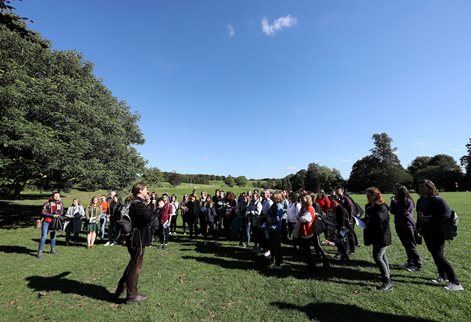
Placements
In your second year you can choose the Literature in Practice or Media in Practice placement modules which will allow you to gain professional experience in a relevant workplace environment.
Students undertake a placement with local publishers, radio stations, social media marketing departments, PR firms, charities etc.
In your third year you can choose the Community Placement – Theory in Practice placement module, again aimed at building on your work with professional experience
The Community Engagement option module in your final year enables you to apply your learning, gain valuable skills and experience a different way of learning.
The module involves 30 to 50 hours of voluntary work with a not-for-profit or community organisation. The placement is assessed and contributes to your degree.
Taking a short-term placement in a relevant in media, publishing or education organisation, or in the voluntary sector enables you to:
- apply your learning to real life situations and challenges
- get an insight in to how businesses and organisations function
- develop existing skills and discover new ones
- explore career options
- make professional contacts
- build confidence and organisational skills.
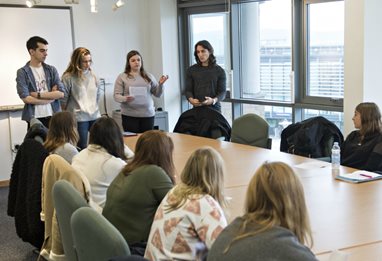
Showcasing your talent
The Scrivener series of talks runs twice a semester giving you the chance to chat to a professional writer about their work. This then feeds into open mic nights where you can showcase your work.
As a Creative Writing student you will have the opportunity to organise your own academic conference in your final year, centred around celebrating you and your fellow student's work.
Students organise all aspects of the management and organisation of the event and give a presentation at the conference.
All Creative Writing students also receive a weekly email digest of writing competitions and opportunities to encourage you to get your work out there and think about the future.
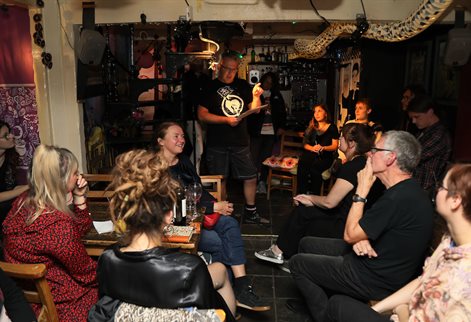
Royal Literary Fund Fellow
If you want professional feedback on any aspect of your writing, from an essay to a manuscript, you can book a one-to-one tutorial with our resident Royal Literary Fund Fellow.
The sessions are free, confidential and independent of the university. You can get advice on:
- academic writing style and how to answer essay questions
- all aspects of your writing, such as developing and structuring an argument to improving style.
Hannah Vincent, award-winning novelist and playwright, is the current Royal Literary Fund fellow.
The Big Read
Our annual Big Read project in association with the Booker Prize Foundation celebrates the best in contemporary fiction.
As well as getting free copies of Booker-nominated novels you'll get the chance to take part in a series of related events including a masterclass with nominated authors.
Previous Big Read authors include Mohsin Hamed, Jim Crace and 2019 Man Booker Prize winner Anna Burns.
Graduate destinations
Our graduates are equipped with the knowledge and transferable skills needed to pursue a career in many related areas, including publishing, social media, marketing, teaching, journalism, public relations and human resources.
Professional advice and support
Outside of your course, our Careers Service is here to support you as you discover (and re-discover) your strengths and what matters to you. We are here for you throughout your university journey as you work towards a fulfilling and rewarding career.
Connect with our careers team
- Find part-time work that you can combine with your studies.
- Find, or be, a mentor or get involved with our peer-to-peer support scheme.
- Develop your business ideas through our entrepreneurial support network.
- Get professional advice and support with career planning, CV writing and interview top tips.
- Meet potential employers at our careers fairs.
- Find rewarding volunteering opportunities to help you discover more about what makes you tick, and build your CV.
Whatever your career needs, we are here to help. And that's not just while you are a student, our support carries on after you've graduated.
Find out more...
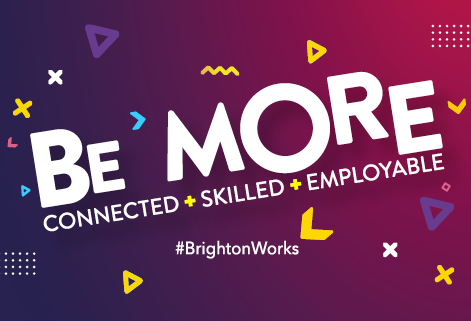
Employment demand for humanities graduates
The British Academy has compiled a report (May 2020) quantifying the demand for arts, humanities and social science (AHSS) skills in the workplace. It helps to answer the legitimate question of what the economic return is on undertaking a degree, both in time and money.
According to the report:
- As arts, humanities and social science (AHSS) graduates progress through the first ten years of their career they are able make strong progress up the career ladder into roles attracting higher salaries
- Arts, humanities and social science (AHSS) graduates are employed in some of the fastest growing sectors including financial services, education, social work, the media and creative industries
- Of the ten fastest growing sectors, eight employ more graduates from AHSS than other disciplines
This makes AHSS graduates at the heart of some of the most exciting, productive, largest and fastest-growing sectors of the UK economy.
Future skills demand
According to the report:
- With the challenges the world is facing – climate change, global pandemics, the growth of populism – the UK needs the insights of the arts, humanities and social sciences (AHSS) as much as those from science, technology and engineering (STEM)
- Evidence within the report shows that Arts, humanities and social science (AHSS) graduates are central to these challenges and changes – they will be vital in giving us the tools to examine and explain human behaviour, understand how society functions, learn from the past and apply those lessons to the present, and analyse the drivers and implications of a changing world and how different countries, places and cultures interact.
Entry criteria
Entry requirements
A-level or BTEC
Entry requirements are in the range of A-level BBB–BCC (120–104 UCAS Tariff points), or BTEC Extended Diploma DMM–MMM. Our conditional offers typically fall within this range.
A-levels must include English language or combined English language and literature.
International Baccalaureate
26 points, with three subjects at Higher level.
Access to HE Diploma
Pass with 60 credits overall. Humanities, history or politics courses preferred. At least 45 credits at level 3.
Studied before or got relevant experience?
A qualification, HE credits or relevant experience may count towards your course at Brighton, and could mean that you do not have to take some elements of the course or can start in year 2 or 3.
English language requirements
IELTS 6.0 overall with a minimum of 5.5 in each element. Find out more about the other English qualifications that we accept.
We can help you meet our English language or academic entry requirements.
Visas and immigration advice
Fees
Course fees
UK (full-time) 9,250 GBP
International (full-time) 13,572 GBP
What's included
You may have to pay additional costs during your studies. The cost of optional activities is not included in your tuition fee and you will need to meet this cost in addition to your fees. A summary of the costs that you may be expected to pay, and what is included in the fee, while studying a course in the School of Humanities are listed here.
- For a number of courses you will have the opportunity to attend field trips and off-site visits. These are optional and are not required to pass your course but under normal circumstances we would expect a budget of approximately £150 per year will cover the costs of particular trips. The amount spent would be based on location and number of trips taken.
- You will have access to computers and necessary software, however many students choose to buy their own hardware, software and accessories. The amount spent will depend on your individual choices but this expenditure is not essential to pass any of our courses.
- In most cases coursework submissions are electronic but you may wish to print notes and should budget up to £150 per year for printing.
- Course books are available from the university but you may wish to budget up to £200 to buy your own copies.
You can chat with our enquiries team through the Stay in touch panel at the end of this page if you require further information. Or check our finance pages for advice about funding and scholarships, as well as more information about fees and advice on international and island fee-paying status.
Info
The fees listed here are for full-time courses beginning in the academic year 2021–22.
Further tuition fees are payable for each subsequent year of study and are subject to an annual increase of no more than 5% or RPI (whichever is the greater). The annual increase for UK students, who are subject to regulated fees, will increase no more than the statutory maximum fee.
You can find out more about our fees in the university's student contract and tuition fee policy (pdf).
The tuition fee you have to pay depends on a number of factors including the kind of course you take, and whether you study full-time or part-time. If you are studying part-time you will normally be charged on a pro rata basis depending on the number of modules you take.
Location
Campus where this course is taught
Falmer campus
Set in the South Downs, our Falmer campus is around four miles from Brighton city centre. 7,000 students are based here taking subjects including criminology, English, education, nursing and medicine, paramedic science, psychology and sociology. Brighton and Hove Albion's Amex stadium and beautiful Stanmer Park are right next door.
Specialist learning facilities at Falmer include the curriculum centre used by teaching and education students, which houses over 30,000 teaching resources and clinical skills and simulation suites used by health students. Psychology students learn in our applied cognition and flexible creative method labs.
Falmer campus has two halls of residence on site, as well as a library, restaurant, cafes, and a students' union shop and bar.
The campus sports centre has a fitness suite, activity studios and a sports hall. There is also a floodlit astroturf football pitch, netball and tennis courts.
Cycle lanes link Falmer with our other campuses and the city centre and there is a BTN BikeShare hub on site. There are regular bus services to the city centre and other campuses. Falmer train station is right next to campus and a nine minute journey to central Brighton.
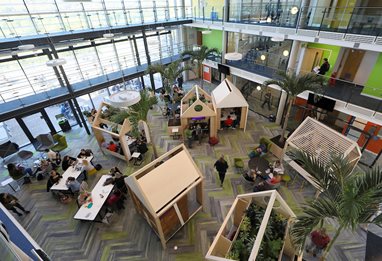
Accommodation
Brighton: Falmer
We guarantee an offer of a place in halls of residence to all eligible students who apply by 30 June.
Halls of residence
We have halls of residence across Brighton in the city centre, Moulsecoomb, Varley Park and Falmer.
- You'll be prioritised for accommodation in the halls that are linked to your teaching base, subject to availability.
- Falmer campus is linked to the halls on Falmer campus and at Varley Park. All halls are self-catered.
- Paddock Field and Great Wilkins halls are on Falmer campus and offer a range of rooms
- Varley Park offers a mix of rooms. It is around two miles from Moulsecoomb campus and four miles from the city centre. Public transport in the city is excellent.
Private renting
There's plenty of support if you opt for private renting. This is an option which offers choice and flexibility – enabling you to choose where you live and who with. We manage our own studenthomes database of properties. This lists accommodation offered by landlords who have signed up to our code of standards. Every summer we provide online events and resources, as well as other advice services, for students looking for a place to live and people to share with.
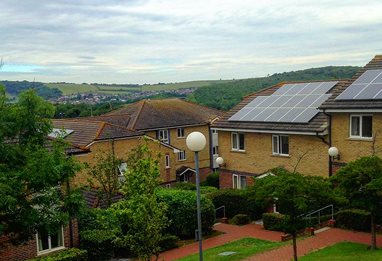
Outside views at Falmer accommodation
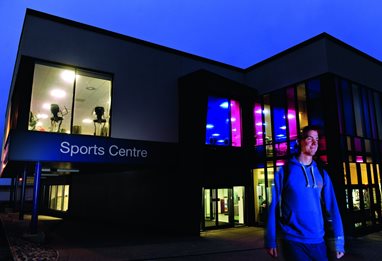
Extensive facilities at Falmer sports centre
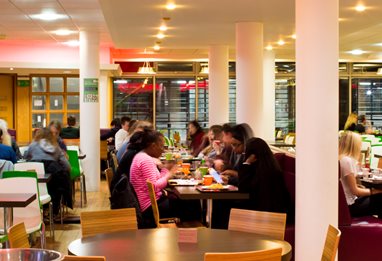
Students dining at Westlain
Local area
About Brighton
The University of Brighton is at the heart of our city's reputation as a welcoming, forward-thinking place which leads the way when it comes to the arts, music, sustainability and creative technology. Brighton is home to a thriving creative community and a digital sector worth £1bn a year to the local economy, as much as tourism.
Many of the work-based learning opportunities offered on our courses such as placements and guest lectures are provided by businesses and organisations based in the city.
You can also get involved with city festivals and events such as the Brighton Festival, the Fringe, Brighton Digital Festival, Brighton Science Festival, the London to Brighton bike ride, and the Great Escape festival of new music to name but a few. Other annual highlights include Pride, the Brighton Marathon, and Burning the Clocks which marks the winter solstice.
You'll find living in Brighton enriches your learning experience and by the end of your course you will still be finding new things to explore and inspire you.
It's only 50 minutes by train from Brighton to central London and less than 40 minutes to Eastbourne. There are also daily direct trains to Bristol, Bedford, Cambridge, Gatwick Airport, Portsmouth and Southampton.
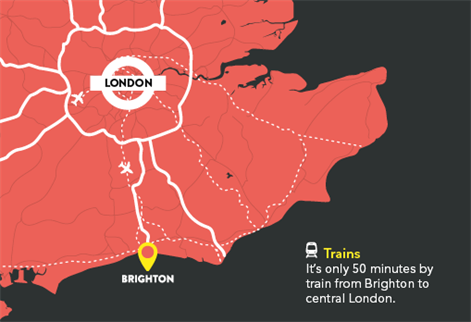
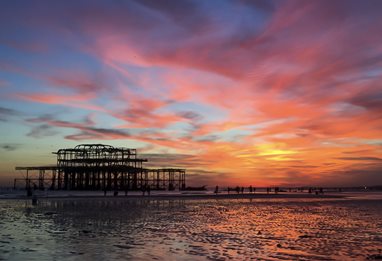
Stay in touch
If you have a question about this course, our enquiries team will be happy to help.
01273 644644
Statistics
Find out more about how the academic year and degree courses are organised, and about learning and assessment activities you might get to grips with at Brighton. More specific information about this course is detailed in the programme specification (linked below). You can find out also about the range of support we offer to help you adjust to university life.
Course and module descriptions on this page were accurate when first published and are the basis of the course. Since this information was published we have made some changes in response to government guidance and social distancing requirements. We are looking forward to being on campus in the autumn, however if government advice changes we may need to make some adjustments to our plans. Find out the latest news on our FAQ for students starting in 2021. Detailed information on any changes we make to modules and learning and assessment activities will be sent to all students by email before enrolment, so that you have all the information before you come to Brighton.
Discover Uni
Discover Uni enables you to compare information when choosing a UK university course. All UK universities publish Discover Uni data on their website.
Programme specification
The programme specification is the approved description of each course. They give a detailed breakdown of the content and structure of the course, and are updated following course changes.
Programme specification
Search again
Source: https://www.brighton.ac.uk/courses/study/creative-writing-ba-hons.aspx
0 Response to "Creative Writing University"
Post a Comment